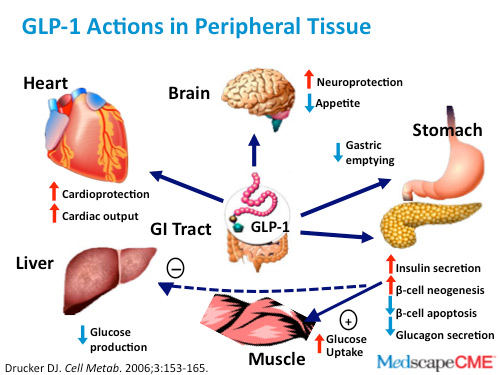Glucagon-like peptide 1 or GLP-1 is a hormone produced in the gut and released in response to food. It causes reduced appetite and the release of insulin.


At present, bariatric surgery is the only truly successful treatment of severe obesity. Mimicking one of the effects of bariatric surgery, namely the increased secretion of glucagon-like peptide (GLP)-1, by artificially increasing the levels of GLP-1 might prove successful as obesity treatment. Recent studies have shown that GLP-1 is a physiological regulator of appetite and food intake which assist in weight loss.
What is glucagon-like peptide 1?
Glucagon-like peptide 1 belongs to a family of hormones called the incretins, so-called because they enhance the secretion of insulin. Because they come from the same source (polypeptide), these hormones share some similarities, so are called ‘glucagon-like’. Cells found in the lining of the small intestine (called L-cells) are the major source of glucagon-like peptide 1, although it is also secreted in smaller quantities by the pancreas and the central nervous system. Glucagon-like peptide 1 encourages the release of insulin from the pancreas, increases the volume of cells in the pancreas which produce insulin (beta cells) and holds back glucagon release.
Glucagon-like peptide 1 reduces appetite after a meal, in that case, if the body releases less of this hormone, individuals may eat more during a meal and are more likely to snack between meals. Dieting, or natural weight loss, is linked to a decrease in glucagon-like peptide 1. The result may be an increased appetite and tendency to regain weight.
Benefits
- These agents have been successfully studied in obese, non-diabetic patients
- Weight loss results seen as early as two weeks into treatment
- Liraglutide especially is shown to be effective for long-term (2 year) weight loss
- Liraglutide even produces greater weight loss results than orlistat
- More favorable effects on HbA1c and blood pressure seen with liraglutide vs. exenatide
- The enhanced satiety is a dose-dependent effect
- Combining soluble fiber with GLP-1 agonists increase weight loss results
Gut Hormone & Bariatric Surgery
GLP-1–based Type-2 Diabetes (T2D) therapies are now commonly used in combination with other drugs with the added weight-loss effect broadening its therapeutic application in human obesity. Since bariatric surgery causes weight loss and T2D remission with enhanced postprandial GLP-1 secretion, the role of GLP-1 as a mediator of surgery-associated benefits has been investigated. However, to date, this hypothesis remains inconclusive because mice lacking GLP-1 receptors (GLP-1Rs) responded similarly to controls after vertical sleeve gastrectomy.
For more:

